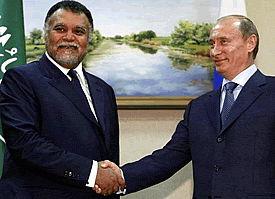According to a diplomatic leak detailing the Bandar-Putin meeting in Moscow on July 31, Bandar suggested that Putin's agreement to abandon the Syrian regime of Bashar al-Assad would lead Saudi Arabia to restrain its Chechen terrorist clients who have been attacking Russia targets for years. Putin reportedly grew furious, interpreting Bandar's offer as a warning that the Sochi games would be threatened by terrorism if Putin didn't comply.
At the time, I was even told that Putin warned Saudi Arabia of potentially severe consequences -- suggesting military retaliation -- if Bandar's implied warning was followed up by actual terrorist attacks like the ones in Volvograd on Monday, killing more than 30 people.
Of course, it is always hard to trace specific terrorist acts back to their origins and many terrorist cells operate with much autonomy. But Putin has staked much of his prestige on a successful Olympics in Sochi, and he also would risk losing face if it were perceived that Bandar had executed a terrorist plan to disrupt the Winter Olympics and that Putin was powerless to stop it.
According to the leaked diplomatic account of last summer's meeting, Bandar sought Russia's cooperation on several Mideast concerns, including Syria, and told Putin, "I can give you a guarantee to protect the Winter Olympics in the city of Sochi on the Black Sea next year. The Chechen groups that threaten the security of the games are controlled by us."
Putin reportedly responded, "We know that you have supported the Chechen terrorist groups for a decade. And that support, which you have frankly talked about just now, is completely incompatible with the common objectives of fighting global terrorism that you mentioned. We are interested in developing friendly relations according to clear and strong principles."
Besides safety for the Sochi Olympics, Bandar raised the potential of Saudi cooperation with Russia on oil and other investment matters, saying, "Let us examine how to put together a unified Russian-Saudi strategy on the subject of oil. The aim is to agree on the price of oil and production quantities that keep the price stable in global oil markets," according to the diplomatic account.
I was told by a source close to the Russian government that this mix of overt inducements and implied threats infuriated Putin who barely kept his anger in check through the end of the meeting with Bandar. Putin viewed Bandar's offer to protect the Sochi Olympics as something akin to a Mafia don shaking down a shopkeeper for protection money by saying, "nice little business you got here, I'd hate to see anything happen to it."
Putin then redoubled his support for the Syrian government in response to Bandar's blend of bribes and warnings. The source said Russia also issued its own thinly veiled threats against the Saudis. The Saudis may have substantial "soft power" -- with their oil and money -- but Russia has its own formidable "hard power," including a huge military, the source said.
Bandar and Terrorism
Over the years, Bandar has often treated the issue of "terrorism" as a situational ethic, an ambivalence well-honed since the days when Saudi Arabia and the Reagan administration teamed up to pour billions of dollars into the Afghan mujahedeen and their Arab jihadist allies fighting Soviet troops in the 1980s.
The anti-Soviet effort in Afghanistan brought to prominence Saudi national Osama bin Laden and the terrorists who later consolidated themselves under the global brand, al-Qaeda. In the 1980s, these roving jihadists were hailed as brave defenders of Islam and even "freedom fighters," but -- in the 1990s -- they began targeting the United States with terrorist attacks, leading up to 9/11 in 2001.
At the time of the 9/11 attacks on New York and Washington, Bandar was the Saudi ambassador to the United States and was so close to the Bush family that he was nicknamed "Bandar Bush." Bandar was also very close to the bin Laden family. After the attacks, Bandar even acknowledged having met Osama bin Laden in the context of bin Laden thanking Bandar for his help financing the Afghan jihad project.
"I was not impressed, to be honest with you," Bandar told CNN's Larry King about bin Laden. "I thought he was simple and very quiet guy."
However, immediately after 9/11, Bandar undermined the FBI's opportunity to learn more about the connections between Osama bin Laden's relatives and the perpetrators of 9/11 when Bandar arranged for members of the bin Laden family to flee the United States on some of the first planes allowed back into the air -- after only cursory interviews with FBI investigators. The only segment of the 9/11 Commission's report to be blacked out was the part dealing with alleged Saudi financing for al-Qaeda.
Now, as chief of Saudi intelligence, Bandar appears to be back in the game of coercive geopolitics, arranging weapons for some of the most brutal Syrian rebels and Arab mercenaries operating inside Syria, while offering carrots-and-sticks to foreign leaders who are seen are malleable toward Saudi regional interests. The technique may have failed with Putin but had greater success in lining up the French behind Saudi opposition to a negotiated agreement with Iran on its nuclear program.
As a repressive monarchy that preaches the ultra-conservative Wahhabi version of Sunni Islam, Saudi Arabia is bitterly opposed to the democratic reforms of the Arab Spring and the growing influence of Shiite Islam, which now stretches from Iran through Iraq and Syria to the Hezbollah enclaves of Lebanon.
(Note: You can view every article as one long page if you sign up as an Advocate Member, or higher).






